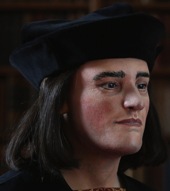 As Ricardians we have known for a long time that Henry Tudor was bad news, but how bad I only recently found out.
As Ricardians we have known for a long time that Henry Tudor was bad news, but how bad I only recently found out.
Just a few days after Henry’s landing at Milford Haven on 7 August 1485 a never before seen disease broke out, which followed him from there via Bosworth Field to London, where by the end of October 1485 several thousand citizens had been killed by it. It is assumed that it was brought to England by Henry’s French mercenaries, who were apparently immune to it. There is clear evidence that it was spoken about before the Battle of Bosworth.
It is said that Thomas Stanley, Henry’s stepfather, tried to use it as an excuse for not joining Richard III’s army before the battle. Could this possibly be an indication that he had been in close contact with his stepson before the battle? After all the Stanleys famously hesitated joining the battle and – once it looked as if Henry was going to be the victor – came in on his side.
The epidemic disappeared during the winter of 1485/86, but there were further outbreaks in 1507, 1517, 1528 and the last major outbreak in 1551, after 1578 it vanished completely. It seems to have reached Ireland in 1492. During the 1528 outbreak it spread to the rest of Europe, killing more than a thousand people in Hamburg in just a few weeks, though it never appeared in France or Italy. This was, however, the only outbreak in mainland Europe.
In 1502 it is believed to have killed Henry’s eldest son, Arthur (leaving the future Henry VIII as heir to the throne). Apparently he took his son’s death very hard. In order to strengthen the succession his wife Elizabeth became pregnant again, giving birth to a daughter named Katherine, who was born and died on 2 February 1503. Elizabeth herself succumbed to post-partum infection a few days later on 11 February. Thus the disease which Henry introduced into England claimed in effect the lives of both his son and his wife. While it might be said to be Henry’s just reward for usurping the throne, his wife and son certainly did not deserve their fate.
 We have a good description of the disease by a physician, John Caius, in his book A Boke or Counseill Against the Disease Commonly Called the Sweate, or Sweatyng Sicknesse. The incubation period was very short and it very often ended within hours in death. The symptoms were those of an acute respiratory disease, followed by extensive sweating, hence the name. The disease seems to have struck all groups of the population, with the most cases among males aged 15 to 45. In some towns it was said to have killed half the population. Its cause has never been established. One suspect is a hantavirus, though this remains controversial.
We have a good description of the disease by a physician, John Caius, in his book A Boke or Counseill Against the Disease Commonly Called the Sweate, or Sweatyng Sicknesse. The incubation period was very short and it very often ended within hours in death. The symptoms were those of an acute respiratory disease, followed by extensive sweating, hence the name. The disease seems to have struck all groups of the population, with the most cases among males aged 15 to 45. In some towns it was said to have killed half the population. Its cause has never been established. One suspect is a hantavirus, though this remains controversial.
This rather fatal side-effect of Henry Tudor’s invasion was first brought to my attention by a web article by Paul Drye (if you can disregard his rather uninformed remarks on Richard III). Further information can be found on Wikipedia, PubMed, the US National Library of Medicine , and on Tudor Place. A good description is by Dr Jim Leavesley in an interview with ABC Radio, though again he seems to be better informed on diseases than history.
Tags: Disease, Henry Tudor, Richard III

2 comments so far
Leave a reply